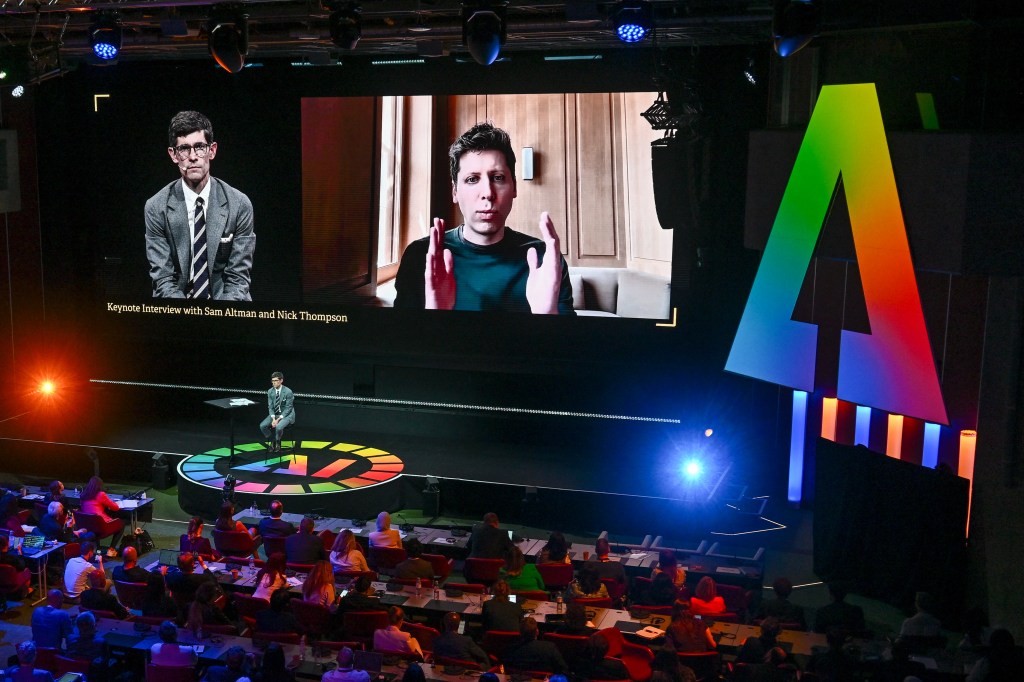Untouched Hampshire electorate gained a barrage of robocalls during which a computer-generated imitation of President Biden discouraged them from vote casting within the January number one. Era the admitted mastermind used to be slapped with felony charges and a proposed FCC fine, his deed is only one wound left through the state-of-the-art era regulation enforcement is suffering to meet up with: synthetic logic.
The arena of computer-generated “deepfakes” can impersonate now not handiest the expression and face of someone however can give a contribution to the manipulation of and the sexual and reputational hurt to folks and the community at massive.
“I think AI is going to affect everything everyone in this room does on a daily basis, and it’s certainly going to affect the work of the Department of Justice,” performing U.S. Legal professional for Massachusetts Joshua Levy mentioned all the way through a reporter roundtable at his office Wednesday. “How that’s exactly going to play out, time will tell.”
Of specific worry to Levy used to be the era’s skill to introduce untouched “doubts” to time-tested forensic proof at trial.
“We rely a lot on … audiotape, videotape in prosecutor cases,” he mentioned. “We have to convince 12 strangers (the jury) beyond a reasonable doubt of someone’s guilt. And when you introduce AI and doubts that can be created by that, it’s a challenge for us.”
Lawmakers around the community and world wide are looking to catch as much as the fast-growing era and its prison research has turn out to be a scorching instructional subject.
Lead-level strikes
“We’re going to see more technological change in the next 10, maybe next five, years than we’ve seen in the last 50 years and that’s a fact,” President Biden said in October simply earlier than signing an executive order to regulate the technology. “The most consequential technology of our time, artificial intelligence, is accelerating that change.”
“AI is all around us,” Biden endured. “To realize the promise of AI and avoid the risk, we need to govern this technology.”
Amongst many alternative rules, the layout directed the Branch of Trade to assemble a machine of labeling AI-generated content material to “protect Americans from AI-enabled fraud and deception” and makes an attempt to fortify privateness protections via investment analysis into the ones disciplines.
In February, the U.S. Branch of Justice — of which Levy’s place of work is a regional phase — appointed its first “Artificial Intelligence Officer” to spearhead the branch’s working out and efforts at the briefly rising applied sciences.
“The Justice Department must keep pace with rapidly evolving scientific and technological developments in order to fulfill our mission to uphold the rule of law, keep our country safe, and protect civil rights,” Legal professional Normal Merrick Garland mentioned within the announcement.
AI Officer Jonathan Mayer, an worker schoolteacher at Princeton College, the DOJ defined, will probably be amongst a workforce of technical and coverage mavens that can advise management on technological disciplines like cybersecurity and AI.
Around the Atlantic, the Ecu Union in March handed its personal AI law framework, the AI Act, that had spent 5 years in construction.
Probably the most legislative leaders at the factor, the Romanian lawmaker Dragos Tudorache, mentioned forward of the vote that the business “has nudged the future of AI in a human-centric direction, in a direction where humans are in control of the technology,” according to the Associated Press.
Sam Altman, the CEO and cofounder of OpenAI — maker of the vastly widespread ChatGPT service powered through AI massive language fashions — in Would possibly of closing occasion referred to as on Congress to keep an eye on his trade.
“There should be limits on what a deployed model is capable of and then what it actually does,” he mentioned at the Senate hearing, calling for an company to license massive AI operations, assemble requirements and behavior audits on compliance.
Surrounding-level strikes
Biden’s government layout isn’t everlasting law. Within the a lack of federal-level rules, states are making their very own strikes to mildew the era the way in which they would like it.
The tool trade advocacy staff BSA The Tool Alliance tracked 407 AI-related bills throughout 41 U.S. states via Feb. 7 of this occasion, with greater than part of them presented in January isolated. Era the expenses handled a medley of AI-related problems, just about part of them — 192 — needed to do with regulating “deepfake” problems.
In Massachusetts, Legal professional Normal Andrea Campbell in April issued an “advisory” to lead “developers, suppliers, and users of AI” on how their merchandise should paintings inside present regulatory and prison frameworks within the commonwealth, together with its shopper coverage, anti-discrimination and knowledge safety rules.
“There is no doubt that AI holds tremendous and exciting potential to benefit society and our Commonwealth in many ways, including fostering innovation and boosting efficiencies and cost-savings in the marketplace,” Campbell mentioned in the announcement. “Yet, those benefits do not outweigh the real risk of harm that, for example, any bias and lack of transparency within AI systems, can cause our residents.”
The Usher in requested the places of work of each Campbell and Gov. Maura Healey about untouched traits at the AI law entrance. Healey’s place of work referred the Usher in to Campbell’s place of work, which didn’t reply through closing date.
At the alternative coast, California is making an attempt to manage the way in which on regulating the era increasing into nearly each sector at lightspeed — however to not keep an eye on it so parched that the shape turns into unattractive to the rich tech companies the fee.
“We want to dominate this space, and I’m too competitive to suggest otherwise,” California Gov. Gavin Newsom mentioned at a Wednesday tournament saying a height in San Francisco the place the shape would believe AI equipment to take on thorny issues like homelessness. “I do think the world looks to us in many respects to lead in this space, and so we feel a deep sense of responsibility to get this right.”
The dangers: Manipulation
The Untouched Orleans Democratic Birthday celebration marketing consultant who mentioned he used to be in the back of the Biden-mimicking voice-cloning robocalls allegedly did so very cost effectively and with out elite era: through paying a New Orleans street magician $150 to produce the expression on his pc.
The brochure plot had deny direct felony codes concerned. The Untouched Hampshire lawyer common on Would possibly 23 had mastermind Steven Kramer indicted on 13 counts each and every of criminal voter suppression and misdemeanor impersonation of a candidate. The Federal Communications Fee the similar presen proposed a $6 million tremendous on him for violations of the “Truth in Caller ID Act” for the reason that yelps spoofed the choice of a neighborhood celebration operative.
Simply the presen earlier than, FCC Chairwoman Jessica Rosenworcel introduced proposals to add transparency to AI-manipulated political messaging, however restrained shorten of suggesting the content material be restrained.
The announcement mentioned that “AI is expected to play a substantial role in the creation of political ads in 2024 and beyond” and that community hobby obliges the fee “to protect the public from false, misleading, or deceptive programming.”
A have a look at the instructional literature at the subject over the closing a number of years is rife with examples of manipulations in international nations or through international actors running right here within the U.S.
“While deep-fake technology will bring certain benefits, it also will introduce many harms. The marketplace of ideas already suffers from truth decay as our networked information environment interacts in toxic ways with our cognitive biases,” authors Bobby Chesney and Danielle Citron wrote within the California Legislation Evaluate in 2019.
“Deep fakes will exacerbate this problem significantly. Individuals and businesses will face novel forms of exploitation, intimidation, and personal sabotage. The risks to our democracy and to national security are profound as well,” their paper “Deep Fakes: A Looming Challenge for Privacy, Democracy, and National Security” endured.
Since 2021, a TikTok parody account referred to as @deeptomcruise has illustrated simply how tough the era has turn out to be through splicing Hollywood celebrity Tom Cruise’s face on others’ our bodies and cloning his expression. The playful experiment nonetheless required state of the art graphics processing and copious pictures to coach the AI on Cruise’s face.
“Over time, such videos will become cheaper to create and require less training footage, author Todd Helmus wrote in a 2022 RAND Corporation primer on the technology and the disinformation it can propel.
“The Tom Cruise deepfakes came on the heels of a series of deepfake videos that featured, for example, a 2018 deepfake of Barack Obama using profanity and a 2020 deepfake of a Richard Nixon speech — a speech Nixon never gave,” Helmus wrote. “With each passing iteration, the quality of the videos becomes increasingly lifelike, and the synthetic components are more difficult to detect with the naked eye.”
As for the dangers of the era, Helmus says “The answer is limited only by one’s imagination.”
“Given the degree of trust that society places on video footage and the unlimited number of applications for such footage, it is not difficult to conceptualize many ways in which deepfakes could affect not only society but also national security.”
Chesney and Citron’s paper integrated a long bulleted record of conceivable manipulations, from one indistinguishable to the Biden-aping robocalls to “Fake videos (that) could feature public officials taking bribes, displaying racism, or engaging in adultery” or officers and leaders discussing battle crimes.
The dangers: Sexual privateness
In a separate article for the Yale Law Journal, Citron, who used to be next a Boston College schoolteacher, reviewed the wear led to through deepfake pornography.
“Machine-learning technologies are being used to create ‘deep-fake’ sex videos — where people’s faces and voices are inserted into real pornography,” she wrote. “The end result is a realistic looking video or audio that is increasingly difficult to debunk.”
“Yet even though deep-fake videos do not depict featured individuals’ actual genitals (and other private parts),” she endured, “they hijack people’s sexual and intimate identities. … They are an affront to the sense that people’s intimate identities are their own to share or keep to themselves.”
Her paper integrated some unfortunate examples, during which celebrities like Gal Godot, Scarlett Johansson and Taylor Hasty have been subjected to the AI-generated porn remedy, in once in a while very nasty contexts. Others have been striking looking for aid to generate such imagery in their former intimate companions. Faux porn used to be product of an Indian journalist and disseminated extensively to spoil her popularity for the reason that folk who made it didn’t like her protection.
Citron concludes with a survey of prison steps that may be tested, however states that “Traditional privacy law is ill-equipped to address some of today’s sexual privacy invasions.”
On the Wednesday roundtable, U.S. Legal professional Levy discovered the pornographic implications of the era similarly as tough because the alternative connotations.
“I’m not an expert on child pornography law, but if it’s an artificial image, I think it’s going to raise serious questions of whether that’s prosecutable under federal law,” he mentioned. “I’m not taking an opinion on that, but that’s a concern I think about.”

Picture through OLIVIER DOULIERY/AFP by way of Getty Photographs
On this photograph representation, a telephone display screen presentations a remark from the top of safety coverage at META is perceivable in entrance of a faux video of Ukrainian President Volodymyr Zelensky calling on his infantrymen to put ill their guns. (Picture through OLIVIER DOULIERY/AFP by way of Getty Photographs)

Picture through DREW ANGERER/AFP by way of Getty Photographs
OpenAI, the author of ChatGPT and symbol generator DALL-E, mentioned it used to be checking out “Sora,” perceivable right here in a February photograph representation, which might permit customers to assemble lifelike movies with a easy steered. (Picture through DREW ANGERER/AFP by way of Getty Photographs)

Picture through Chip Somodevilla/Getty Photographs
College of Maryland regulation faculty schoolteacher Danielle Citron and OpenAI Coverage Director Jack Clark testify earlier than the Space Perception Committee about ‘deepfakes,’ digitally manipulated video and nonetheless photographs, all the way through a listening to within the Longworth Space Workplace Construction on Capitol Hill June 13, 2019 in Washington, DC. (Picture through Chip Somodevilla/Getty Photographs)




